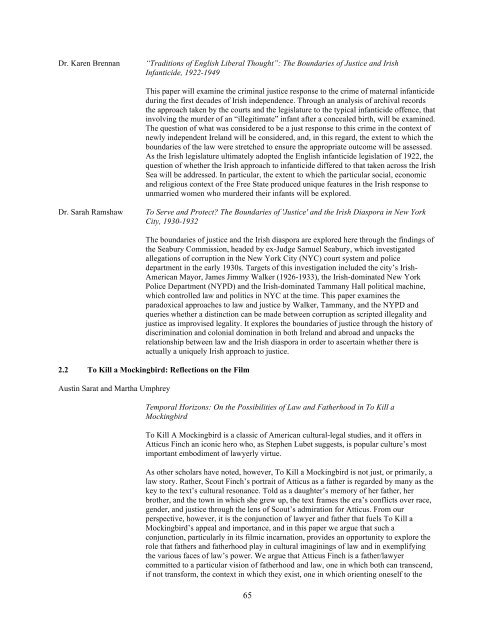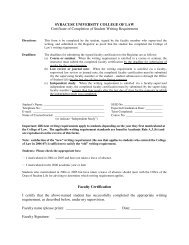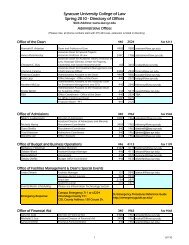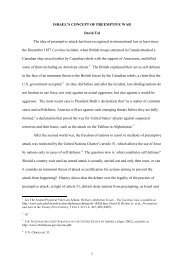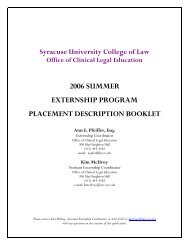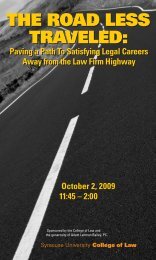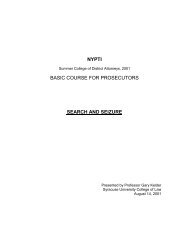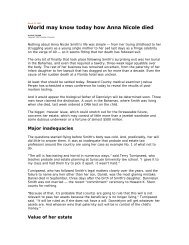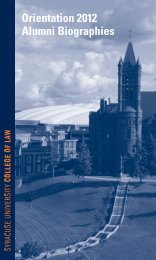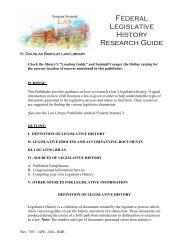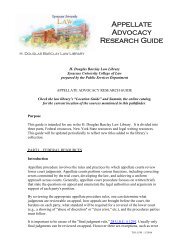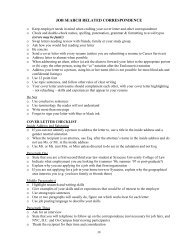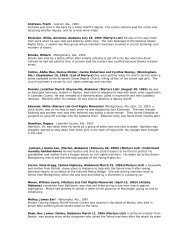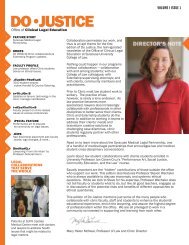2011 Conference Program (PDF) - Syracuse University College of Law
2011 Conference Program (PDF) - Syracuse University College of Law
2011 Conference Program (PDF) - Syracuse University College of Law
You also want an ePaper? Increase the reach of your titles
YUMPU automatically turns print PDFs into web optimized ePapers that Google loves.
Dr. Karen Brennan<br />
“Traditions <strong>of</strong> English Liberal Thought”: The Boundaries <strong>of</strong> Justice and Irish<br />
Infanticide, 1922-1949<br />
This paper will examine the criminal justice response to the crime <strong>of</strong> maternal infanticide<br />
during the first decades <strong>of</strong> Irish independence. Through an analysis <strong>of</strong> archival records<br />
the approach taken by the courts and the legislature to the typical infanticide <strong>of</strong>fence, that<br />
involving the murder <strong>of</strong> an “illegitimate” infant after a concealed birth, will be examined.<br />
The question <strong>of</strong> what was considered to be a just response to this crime in the context <strong>of</strong><br />
newly independent Ireland will be considered, and, in this regard, the extent to which the<br />
boundaries <strong>of</strong> the law were stretched to ensure the appropriate outcome will be assessed.<br />
As the Irish legislature ultimately adopted the English infanticide legislation <strong>of</strong> 1922, the<br />
question <strong>of</strong> whether the Irish approach to infanticide differed to that taken across the Irish<br />
Sea will be addressed. In particular, the extent to which the particular social, economic<br />
and religious context <strong>of</strong> the Free State produced unique features in the Irish response to<br />
unmarried women who murdered their infants will be explored.<br />
Dr. Sarah Ramshaw<br />
To Serve and Protect The Boundaries <strong>of</strong> 'Justice' and the Irish Diaspora in New York<br />
City, 1930-1932<br />
The boundaries <strong>of</strong> justice and the Irish diaspora are explored here through the findings <strong>of</strong><br />
the Seabury Commission, headed by ex-Judge Samuel Seabury, which investigated<br />
allegations <strong>of</strong> corruption in the New York City (NYC) court system and police<br />
department in the early 1930s. Targets <strong>of</strong> this investigation included the city’s Irish-<br />
American Mayor, James Jimmy Walker (1926-1933), the Irish-dominated New York<br />
Police Department (NYPD) and the Irish-dominated Tammany Hall political machine,<br />
which controlled law and politics in NYC at the time. This paper examines the<br />
paradoxical approaches to law and justice by Walker, Tammany, and the NYPD and<br />
queries whether a distinction can be made between corruption as scripted illegality and<br />
justice as improvised legality. It explores the boundaries <strong>of</strong> justice through the history <strong>of</strong><br />
discrimination and colonial domination in both Ireland and abroad and unpacks the<br />
relationship between law and the Irish diaspora in order to ascertain whether there is<br />
actually a uniquely Irish approach to justice.<br />
2.2 To Kill a Mockingbird: Reflections on the Film<br />
Austin Sarat and Martha Umphrey<br />
Temporal Horizons: On the Possibilities <strong>of</strong> <strong>Law</strong> and Fatherhood in To Kill a<br />
Mockingbird<br />
To Kill A Mockingbird is a classic <strong>of</strong> American cultural-legal studies, and it <strong>of</strong>fers in<br />
Atticus Finch an iconic hero who, as Stephen Lubet suggests, is popular culture’s most<br />
important embodiment <strong>of</strong> lawyerly virtue.<br />
As other scholars have noted, however, To Kill a Mockingbird is not just, or primarily, a<br />
law story. Rather, Scout Finch’s portrait <strong>of</strong> Atticus as a father is regarded by many as the<br />
key to the text’s cultural resonance. Told as a daughter’s memory <strong>of</strong> her father, her<br />
brother, and the town in which she grew up, the text frames the era’s conflicts over race,<br />
gender, and justice through the lens <strong>of</strong> Scout’s admiration for Atticus. From our<br />
perspective, however, it is the conjunction <strong>of</strong> lawyer and father that fuels To Kill a<br />
Mockingbird’s appeal and importance, and in this paper we argue that such a<br />
conjunction, particularly in its filmic incarnation, provides an opportunity to explore the<br />
role that fathers and fatherhood play in cultural imaginings <strong>of</strong> law and in exemplifying<br />
the various faces <strong>of</strong> law’s power. We argue that Atticus Finch is a father/lawyer<br />
committed to a particular vision <strong>of</strong> fatherhood and law, one in which both can transcend,<br />
if not transform, the context in which they exist, one in which orienting oneself to the<br />
!<br />
65


